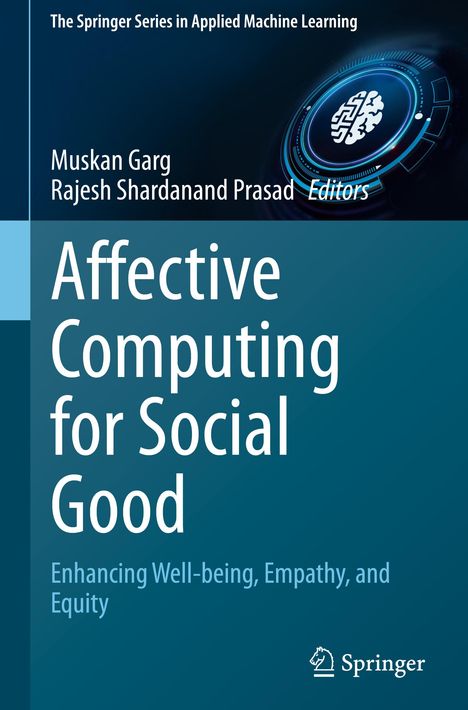Affective Computing for Social Good, Gebunden
Affective Computing for Social Good
- Enhancing Well-being, Empathy, and Equity
(soweit verfügbar beim Lieferanten)
- Herausgeber:
- Rajesh Shardanand Prasad, Muskan Garg
- Verlag:
- Springer Nature Switzerland, 10/2024
- Einband:
- Gebunden, HC runder Rücken kaschiert
- Sprache:
- Englisch
- ISBN-13:
- 9783031638206
- Artikelnummer:
- 11998575
- Umfang:
- 284 Seiten
- Nummer der Auflage:
- 2024
- Ausgabe:
- 2024
- Gewicht:
- 594 g
- Maße:
- 241 x 160 mm
- Stärke:
- 21 mm
- Erscheinungstermin:
- 8.10.2024
- Hinweis
-
Achtung: Artikel ist nicht in deutscher Sprache!
Klappentext
Affective Computing for Social Good: Enhancing Well-being, Empathy, and Equity offers an insightful journey into the intricate realm of affective computing. It covers a spectrum of topics ranging from foundational theories and technologies to ethical considerations and future possibilities.
Beginning with "Deciphering the Emotional Spectrum: Advances in Emotion Science and Analysis," it sets the stage by tracing the evolution of understanding human emotions. Subsequent chapters explore practical applications, such as integrating clinical psychology with affective computing for therapeutic progress and leveraging affective computing in diagnosing and managing mood disorders more efficiently.
As the narrative unfolds, the book emphasizes the crucial role of affective computing in fostering social justice and equity. It underscores the need for developing inclusive algorithms and databases while addressing ethical challenges like privacy, consent, and the risk of emotional manipulation. These discussions emphasize the significance of ethical deployment and regulation.
The book also covers the technical aspects and applications of affective computing, including natural language processing for emotion recognition and analysis, voice emotion detection, and visual emotion recognition. It extends to applications, such as the use of affective computing in health management via recommender systems and personalized well-being interventions in mental health care.
Addressing data challenges, "Enhancing Affective Computing with Data Augmentation: Strategies for Overcoming Limited Data Availability" presents solutions for imbalances affecting model performance. "Advancements in Multimodal Emotion Recognition" highlights the integration of facial expressions with physiological signals to improve emotion recognition accuracy and reliability.
Concluding with "Ethical Considerations in Affective Computing" and "Cognitive Currents: A Path from Neuroscience to Consciousness," the book connects technical advancements in affective computing with broader ethical and philosophical inquiries surrounding consciousness and the human experience.
Features:
Helps readers understand the potential benefits of emotionally intelligent AI systems, such as improving mental health care, enhancing education, or promoting more ethical decision-making.
Addresses ethical considerations related to the development and deployment of emotionally intelligent AI systems, helping readers to become more aware of the potential risks and trade-offs involved.
Presents new approaches or frameworks for developing emotionally intelligent AI systems, providing readers with innovative ideas and perspectives.
Provides examples of successful case studies where emotionally intelligent AI systems were used for social good, which may inspire readers to think about how they can contribute to society through AI development.
Overall, this book will help readers gain a deeper understanding of the intersection between AI and human emotions, and how this technology can be used to create a more empathetic, compassionate, and socially responsible world.



